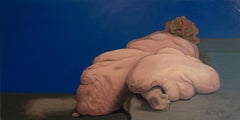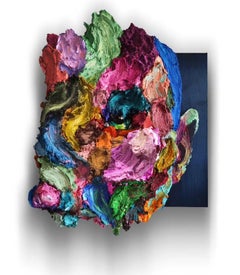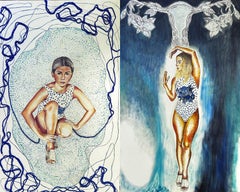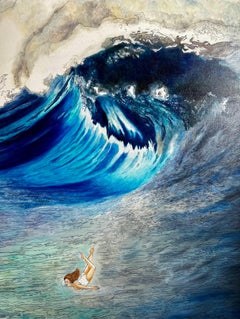Video Loading
Want more images or videos?
Request additional images or videos from the seller
1 of 3
Marc GonzHidden eye2023
2023
$3,759.97List Price
About the Item
DEGREE IN FINE ARTS. University of Barcelona Exhibitions: UXVAL GOCHEZ GALLERY.Barcelona SAATCHI LONDON GALLERY. London FOLD GALLERY. London FERRAN CANO GALLERY. Barcelona NUNOSACRAMENTO GALLERY. Portugal ATELIER RICHELIEU. Paris PALAU OF MUSIC. Valencia. PALAU OF THE VIRREIN. Barcelona ESPAI JAUME MUXART. Barcelona AFFORDABLE ART FAIR. Amsterdam. CLOISTER OF THE ROYAL MONASTERY. Barcelona
Awards: ACCESSIT. PLASTIC ARTS CONTEST. Valencia X COMPETITION OF UNED. Madrid BIENNIAL OF THE MOSTRA D'ART CONTEMPORANI CATALÀ.
About the Seller
No Reviews Yet
Vetted Professional Seller
Every seller passes strict standards for authenticity and reliability
Established in 2014
1stDibs seller since 2022
5 sales on 1stDibs
Authenticity Guarantee
In the unlikely event there’s an issue with an item’s authenticity, contact us within 1 year for a full refund. DetailsMoney-Back Guarantee
If your item is not as described, is damaged in transit, or does not arrive, contact us within 7 days for a full refund. Details24-Hour Cancellation
You have a 24-hour grace period in which to reconsider your purchase, with no questions asked.Vetted Professional Sellers
Our world-class sellers must adhere to strict standards for service and quality, maintaining the integrity of our listings.Price-Match Guarantee
If you find that a seller listed the same item for a lower price elsewhere, we’ll match it.Trusted Global Delivery
Our best-in-class carrier network provides specialized shipping options worldwide, including custom delivery.You May Also Like
Italian Oil on Canvas Painting Coat of Arms in Gold Leaves Panel and Black Frame
Located in Firenze, IT
This huge Italian 19th century armorial painting features the coat of arms of Montini, a noble Italian family that
has among its ancestors the Archbishop of Milan, later known as Pope Paul VI.
The large oval canvas has a brown and red background, the latter shaped like a shield, in which six mountains
(from the etymology of the surname) and three white fleur de lis are painted.
This big scale palatial oil painting...
Category
Late 19th Century Italian School Figurative Paintings
Materials
Oil, Canvas, Wood
$5,874
H 67.33 in W 53.55 in D 2.37 in
Italian Oil on Alabaster Painting Pompeian Interior Scene in Ormolu Frame
Located in Firenze, IT
This Italian 19th century oil on alabastrer painting depicts an opulent interior in full ancient neoclassical Pompeian style with people festing.
The figurative inner scene is painted on a rectangular alabaster slab and housed in a wonderful giltbronze frame resting on casted arrow feet.
This is a single section of a bigger surtout de table. You can now use it as a decorative centrepiece on a table or on a console or turn it into a wall decoration. We can provide framing options in this case.
The characters enjoy a rich banquet in an elaborate interior, the room renderings...
Category
19th Century Italian School Interior Paintings
Materials
Alabaster, Bronze
$5,522
H 17.33 in W 23.63 in D 1.97 in
Three Figures
By Wifredo Lam
Located in Beverly Hills, CA
Provenance:
Cernuda Art, Coral Gables
Private Collection, Los Angeles
Category
1970s Modern Figurative Paintings
Materials
Canvas, Oil
Butcher’s Apprentice, Late 19th Century
Located in Greding, DE
Depiction of a butcher's apprentice against an undefined brown background. He is balancing a large wicker basket filled with ham on his head. He wears a cap with a red tie, brown ves...
Category
Late 19th Century Figurative Paintings
Materials
Canvas, Oil
Nine Miniature Paintings, Probably 18th Century
Located in Greding, DE
A group of nine finely executed miniature oil paintings on cardboard, framed in a simple wooden frame. The subjects range from landscape scenes with soldiers to ducks by a riverside ...
Category
18th Century Figurative Paintings
Materials
Oil, Cardboard
Judgment of Paris, Italy, 19th Century
Located in Greding, DE
Painting depicting the Judgement of Paris. Oil on canvas. Dimensions: 22 x 27.5 cm. Inscribed on the reverse of the frame: Giovani Barel? Venezia. Black profiled wooden frame with gi...
Category
19th Century Figurative Paintings
Materials
Oil
Large Painting of a Battle, Figurative Painting, 18th Century
Located in Greding, DE
Antique battle scene with horsemen in front of landscape scenery. Oil on canvas. Framed in a black wooden frame with a gold patinated moulding. The canvas with strong craquelure. Siz...
Category
18th Century Figurative Paintings
Materials
Oil
$7,637
H 49.61 in W 63 in D 2.76 in
19th Century Roman Landscape oil on canvas with Giltwood Frame
Located in Rome, IT
Amaizing 19' century Roman landscape depicting a part of Villa Borghese with Trinità dei Monti.
With a finely carved gilt wood coeval frame.
Measurements with frame cm 65 x78 wit...
Category
19th Century Old Masters Landscape Paintings
Materials
Oil
$5,287
H 25.6 in W 30.71 in D 1.97 in
Venus with Putti Oil on Canvas with Gilt-wood Frame
Located in Rome, IT
French 19' century painting oil on canvas . Young Venus nude figure surrounded by delicious playing putti .
Finely carved and gilt-wood frame of the same period .
Measurements w...
Category
Mid-19th Century Romantic Nude Paintings
Materials
Oil
Four Oval Shaped 19' Century Allegorical Paintings
Located in Rome, IT
Set of four delicious putto figures , oval shape oil on canvas .
Fine tromple oeil painted frame .
Very good original condition.
Category
19th Century Figurative Paintings
Materials
Canvas, Oil
$25,849
H 45.28 in W 35.44 in D 1.19 in
More From This Seller
View AllAfectata
Located in BARCELONA, ES
Felix Campean's work presents a hyper-realistic human body, displaying every muscle and texture with astonishing precision. The intense colors and slightly distorted shape of the bod...
Category
2010s Figurative Paintings
Materials
Linen, Oil
$2,349 Sale Price
20% Off
Cake Boy I
Located in BARCELONA, ES
MARC GONZ
THE HIDDEN GAZE
When confronted with the universe of Marc Gonz, we discover creations that seem to be the result of a working session of a hyperactive action painter ...
Category
2010s Figurative Paintings
Materials
Oil
CURA E CRIAÇÃO
Located in BARCELONA, ES
Polly D’ Avila's artwork delves into shades of blue to evoke introspection and self-knowledge. Her pieces reflect on the transience of life, healing, creation, and fertility, capturi...
Category
2010s Contemporary Figurative Paintings
Materials
Canvas, Oil
LEVEN
Located in BARCELONA, ES
Polly D’ Avila's artwork delves into shades of blue to evoke introspection and self-knowledge. Her pieces reflect on the transience of life, healing, creation, and fertility, capturi...
Category
2010s Contemporary Figurative Paintings
Materials
Canvas, Oil
Foam Thai
Located in BARCELONA, ES
Most of Marc Gonz's recent works are portraits or fragments of human faces: we recognize the shape, see ears, noses and lips of figures that look like young men. What is striking abo...
Category
2010s Figurative Paintings
Materials
Oil
$3,759 Sale Price
20% Off
Oro y sombra de poniente
Located in BARCELONA, ES
This collection, a compendium of sensory and emotional experience, delves into the very essence of painting as a medium of expression.
Each canvas is a testament to the mastery of l...
Category
2010s Naturalistic Landscape Paintings
Materials
Oil, Canvas, Cotton Canvas
Recently Viewed
View AllMore Ways To Browse
Hand Painted Vintage Salon Signs
Henry Darger
Marvel Signed Art
Oil Painting Opera
Painting Of Israel
Persian Oil Painting
Ramon Oil Paintings Ramon
Red Devil
Red Nose
18th Century Venetian Paintings
Ascoli Piceno
Blue Boy Painting
Damaged Art
H R Giger
Ice Hockey Art
Impressionist Ballerina Painting
Italian Painters 20th Century
Midwest Painting



